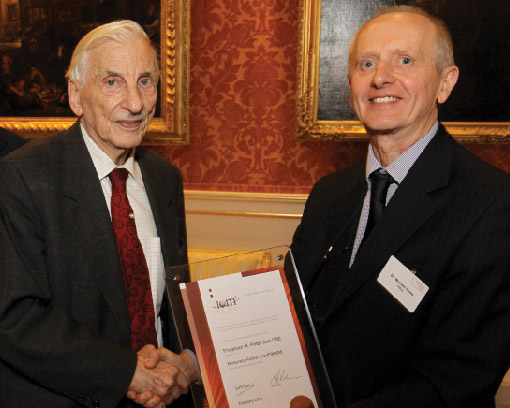Great pioneers that inspire us: Hans Peter Jost
 At Machinery Lubrication India, we constantly endeavor to enhance the content of our publication. Keeping in mind the interest of our subscribers, we are starting a special section ‘Great Pioneers that inspire us’.
At Machinery Lubrication India, we constantly endeavor to enhance the content of our publication. Keeping in mind the interest of our subscribers, we are starting a special section ‘Great Pioneers that inspire us’.
We have great pioneers who made a profound impact on industry and academia with their works, inventions, research and writings. One of them was Dr Hans Peter Jost. He needs no introduction to the professionals and academicians in the field of tribology and lubrication.
In this section, we will look at the life, the challenges and the achievements of Dr Jost, one of the most outstanding pioneers of all time.
Although the discipline of tribology, the study of friction, wear and lubrication, was only named in the 1960s, it had been a crucial aspect of human endeavour for millennia. An Egyptian bas-relief showed workers dragging a statue on a wooden sled while another man was pouring liquid on to the track ahead of it to smooth its progress. He was the world's first recorded tribologist, Hans Peter Jost.
Professor Peter Jost was pre-eminent in tribology (the study of friction), which he conceived, developed, applied and promoted with exceptional vigour during his years of career. A distinguished contributor to professional and public life, there can hardly be another British engineer with more worldwide honours and decorations, nor anyone more active in promoting engineering.
We cannot deny that he made the world spin a little more smoothly. However, separate German, USA, Canadian, Chinese, UK and Japanese surveys, based on his ground breaking 1966 study for the Department of Education and Science and his subsequent papers, have concluded that tribology, the interdisciplinary science and engineering of interacting surfaces in relative motion, mitigates costly friction and wear effects to the enormous extent of 1.1% to 1.4% of gross domestic product.
The Beginnings
Hans Peter Jost studied at Liverpool Technical College and Manchester College of Technology where his interest began in engineering. He began his career as an apprentice at Associated Metal Works, Glasgow, and Napier and Sons in Liverpool, winning the Sir John Larking Medal for a paper on Measurement of Surface Finish.
General Manager of international lubricants company Trier Bros at 29, he had developed an innovative steam machinery lubrication method. The oil-free aqueous colloidal graphite lubrication system saved energy and water by preventing the boiler tubes scaling up, which had often caused them to burst in the past. British Petroleum adopted the new system at its five new refineries, as did Shell Tankers and the lubrication system became essential until reciprocating steam plant became obsolete. By 1960, Jost had become lubrication consultant to Richard Thomas and Baldwins.


Big Achievements
 Sixty years after he launched a whole new field of engineering, Dr Peter Jost was honoured with one of the Royal Academy of Engineering's top accolades – the Sustained Achievement Award – for his vision and achievements in tribology, the science and engineering of interacting moving surfaces. What might appear to be mundane issues of friction and lubrication are now understood to have applications way beyond engineering, from medicine and dentistry to nano technology.
Sixty years after he launched a whole new field of engineering, Dr Peter Jost was honoured with one of the Royal Academy of Engineering's top accolades – the Sustained Achievement Award – for his vision and achievements in tribology, the science and engineering of interacting moving surfaces. What might appear to be mundane issues of friction and lubrication are now understood to have applications way beyond engineering, from medicine and dentistry to nano technology.
One of Dr Jost's companies, Centralube, designed sophisticated, mission-critical engineering lubrication and allied systems for steel mills, refineries, space vehicles and forges, and for ships such as the Class T45 Destroyers and the new aircraft carriers.
Dr Jost's influential advice to the UK government included the very significant 1966 DES Jost Report, which demonstrated that friction and avoidable wear were costing the UK huge sums of money every year and resulted in the UK setting up several national centres for tribology.
Jost served as a director and chairman of several technology and engineering companies including the solid lubricants company K S Paul, and Engineering & General Equipment. He was an honorary fellow of the Institution of Engineering and Technology, the Institution of Mechanical Engineers and of the Institute of Materials.
A Man of Many Firsts
Centralube's ferrous industry interests led to Jost becoming the world's first steelworks lubrication engineering consultant. He resolved many design problems at Richard Thomas & Baldwin's new Llanwern integrated steelworks and his lubricant specification changes and integrated lubrication distribution systems resulted in substantial operational improvements and cost savings.
In 1966, Jost published a report, commissioned by the government, which showed (for the first time) that the problems of lubrication in engineering were mainly problems of design. Their solutions, Jost argued, needed a range of skills from scientific disciplines other than mechanical engineering – including chemistry and materials science, solid body mechanics and physics. By applying tribology to machine design, Jost and his team calculated that British industry could save £500 million a year as a result of fewer breakdowns causing low production; lower energy consumption; reduced maintenance costs; and longer machine life.
Appointed CBE in 1969, Jost was honoured by the heads of state of France, Germany, Poland, Austria and Japan, and in 1992 he became the first honorary foreign member of the Russia Academy of Engineering. He held two honorary professorships and 11 honorary doctorates including, in January 2000, the first Millennium honorary science doctorate.
Jost report led to the setting up of several national tribology centres in Britain, though initially it was Britain's competitors who took the ball and ran with it. By the late 1980s Britain was lagging behind the US, Germany and Japan.
A press release from five learned societies announcing the creation of a UK Tribology Network to promote best practice observed that while Britain has a strong academic and industrial tribology base, “due to the fragmentation of activity within the UK the impact on reducing the very high cost (circa 1.4 per cent of GDP) of uncontrolled friction, lubrication, surface selection and wear- control within industry has been limited.”
Although tribology was a relatively new science, Jost argued that the principles behind it had been around for centuries. “If in the days of Newton, bananas had been available and Newton had slipped on one of them, the laws of tribology would have been enunciated by him there and then,” he told an interviewer. “Instead, it is said that an apple fell on him while he was asleep under the tree, and the laws of gravity resulted from there.” In 2009, he co-launched the concept of Green Tribology, paving the way for the first Green Tribology World Congress with 2,000 attendees.
He was elected as an honorary fellow at International Tribology Council and World Tribology Congress but sadly passed away before he could formally take up his fellowship. Peter Jost died on 7 June 2016 and left behind his wife Margaret and daughters Jennifer and Gillian. Peter was truly a kind and great man who is been sorely missed.
Did You Know?
- Professor Jost authored more than 150 publications and had been Honorary Editor of Springer’s peer- reviewed international journal, Friction.
- He had been honoured in 18 countries and received state recognition from six. He held Honorary Fellowships from 11 national professional engineering or tribological bodies.
- He was a member of the Parliamentary and Scientific Committee for over 25 years and served many technology committees.
- He had received the Royal Academy of Engineering Sustained Achievement Award in 2013 and had been awarded honorary doctorates at six UK and five international universities.
- He served numerous industry councils, and until his death he was the president of International Tribology Council and a life member of the council of the Parliamentary & Scientific Committee.
